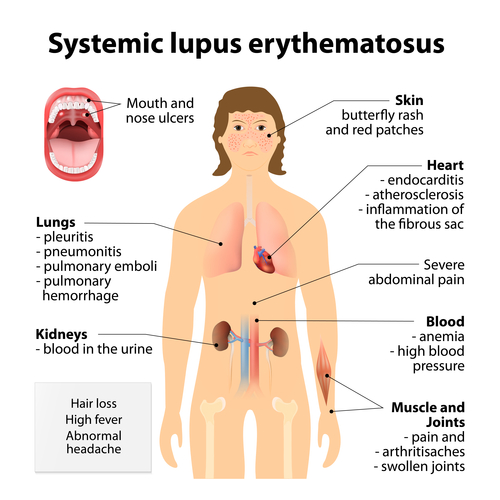Lupus & Neuropathy
 Systemic Lupus Erythematosus (Lupus)
Systemic Lupus Erythematosus (Lupus)
Lupus is a broad term for autoimmune disorders that weaken the body’s immune system by producing antibodies that attack healthy cells, tissues and organs.
The name “lupus” usually refers to the most common form, systemic lupus erythematosus. This disease is characterized by inflammation and damage to different tissues and organs, with many symptoms including fatigue and fever, swollen or painfully inflamed joints, and skin rashes. It can create lupus pain.
Lupus may affect the kidneys, heart, lungs, blood and blood vessels, central nervous system, and peripheral nerves. It may suddenly flare up and then retreat into remission.
The cause of lupus is unknown; environmental and other factors may trigger the disease.
The Centers for Disease Control and Prevention estimates that 1.4 million Americans—mostly women—have lupus. Nevertheless, lupus is difficult to accurately diagnose. There is no definitive test for lupus, and symptoms may change over time.
Medical doctors attempt to control the symptoms with medication.
Symptoms of Lupus
(Not all symptoms may be present.)
- Anemia
- Fatigue
- Fever
- Hair loss
- Headaches, seizures
- Kidney problems
- Loss of appetite, nausea, diarrhea
- Rash across the face and nose
- Raynaud’s phenomenon (pale or purple fingers or toes from exposure to cold temperatures)
- Skin ulcers inside mouth and on the tongue
- Sensitivity to sun
- Serositis (inflamed linings of organs such as the heart and lungs causing chest pain and difficulty breathing)
- Swollen joints
- Swollen glands
- Pain, numbness and tingling in hands or feet
The peripheral nervous system is responsible for motor responses and sensation. Lupus, and other autoimmune conditions rheumatoid arthritis, may cause antibodies in the immune system to directly attack nerve cells and blood vessels.
Also, inflammation and swelling from surrounding tissue can damage these nerves. Or, lupus may impair blood flow to the brain, spinal cord and nerves, which can damage nerve cells and disrupt how they function.
In most cases, peripheral neuropathy is symmetrical, which means it affects both sides of the body. However, peripheral neuropathy may also be non-symmetrical or more sporadic, affecting patches of areas in the body. This can result from vasculitis, or inflammation of the blood vessels.
Lupus and Neuropathy
Symptoms of Neuropathy in Lupus
Symptoms of peripheral neuropathy from lupus can range from mild to serious and mainly affect the hands, feet, legs or arms. They include:
- pain
- burning sensation
- numbness
- tingling
- weakness
- inability to sense heat or cold
- paralysis
- vision problems.
- carpal tunnel syndrome
EVALUATION AND TESTS
(Not all evaluations and tests may be necessary.)
- Neurological exam
- Electromyography
- Nerve conduction velocity test
- Antinuclear antibody (ANA) test
- Blood tests (for the presence of antinuclear [ANA] antibody and for sedimentation rate determination)
- Urine test
- Biopsy of skin or kidney
TREATMENT AND THERAPY
Medical treatment focuses on relieving pain by reducing inflammation, slowing joint and bone damage, and improving the ability to function with the disease.
- Rest and exercise programs.
- Use safety measures due to loss of sensation.
The following drugs are prescribed:
- Aspirin, ibuprofen, and Aleve® (NSAIDs) or Cox-2 inhibitors (NSAIDs)to reduce joint inflammation and pain.
- Antimalarial medication (hydroxychloroquine [Plaquenil®]) to suppress immune response.
- Corticosteroids (prednisone [Deltasone®], hydrocortisone, methylprednisolone [Medrol®], dexamethasone [Decadron®, Hexadrol®]) to suppress inflammation.
- Immunosuppresive medications (azathioprine [Imuran®], cyclophosphamide [Cytoxan®, Neosar®] to slow or reduce immune response
- Natural Treatments:
There are always natural treatments to alleviate these symptoms. These would include anti-inflammatory supplements and supplements to relieve pain.
A nutritionist can be gotten with we can test and find out what will help with the symptoms and to enhance the immune system.
To find a Nutritionist near you, go to Find a Nutritionist
RELIEF?
Treatment for Neuropathy
There are many medications and other remedies that can bring you relief; you can read about them in this article Neuropathy Treatment
RECOMMENDED:
What can you do?
Lasting Relief
None of the various neuropathy treatments will build healthy nerves. You can cover up the symptoms and you can increase circulation and you can make a person feel less pain, etc., but if you build healthy nerves, there will not be any symptoms (healthy nerves don’t hurt, tingle, burn, are not numb, etc.) and the relief will be lasting.
Building Healthy Nerves*
Healthy sensory nerves mean that they are not painful. Healthy nerves mean that they communicate and don’t send wrong signals such as burning, hot and cold, tingling when there is no reason for it. Healthy motor nerves mean that they relay messages from the brain to the muscle so that they move correctly. Nerves need to be healthy to function properly.
The body needs specific nutrients (vitamins) to be able to build healthy nerves.
It may not give immediate relief (although many do feel changes in the first week) as the vitamins are working at a cellular level, but it does address the actual problem, builds healthy nerves and brings lasting relief.
(For temporary relief while building healthy nerves, go to Pain Relief Formula)
What can be done for lasting relief?
Find out how to Build Healthy Nerves
*Studies & Research on Nerve Health
Want to Know More About Neuropathy?
Neuropathy Information Hub
Addressing Autoimmune Conditions – learn how your metabolism can create a problem with your immune system, and what you can do to improve your immune system
STILL HAVE QUESTIONS? CALL (818) 252-1038 OR EMAIL AND GET YOUR QUESTIONS ANSWERED.
Sign up to receive the MCVitamins Newsletter!
Up-to-date info on the latest health-related news happening in the world
(available in English only)

